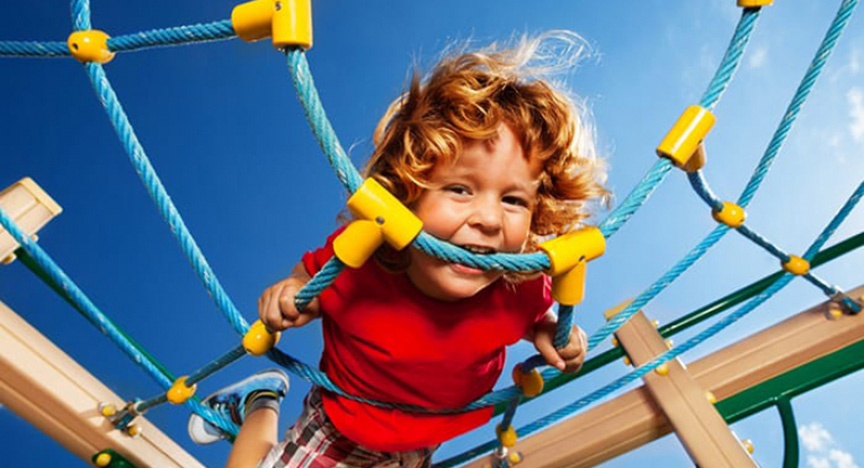
Playing is the natural way that babies and children learn and develop new physical, intellectual and emotional skills. It’s not just human babies that play: about 80 per cent of mammals play, and some other types of animals, like birds and reptiles, have been observed playing, too. Just like us, they appear to play for the same reasons: to learn about themselves and the world around them. Why is play so beneficial to a child’s development? Read on:
1. It lets them explore their senses
Sensory play – play that stimulates a child’s senses of touch, taste, smell, hearing, sight, movement and balance – teaches them how to process what they experience through their senses and helps children begin to understand the world around them from an early age. Learning Potential have sensory play ideas for children of all ages, from creating ‘squishy sensory bags’ to playing with water or playdough.
2. It helps them develop spatial awareness
From birth, babies begin to develop spatial awareness through sensory play. Rocking your baby, placing them on their tummy for ‘tummy time’, or holding your baby close to your face while speaking to them are ‘play’ activities helpful for developing spatial awareness.
Children use their senses to get an idea of the shape, size and weight of objects they handle. From playing with blocks to feeling objects with different textures when exploring outside, lots of different types of play help develop sensory and spatial awareness.
As they grow older, children will use their spatial awareness when learning maths skills.
3. It can decrease their risk of being short-sighted
Playing outside decreases a child’s chance of having myopia or short-sightedness (less able to clearly see objects in the distance). While scientists are still exploring why this is the case – it’s not as simple as spending more time looking at far away things instead of close-up books and screens – the evidence is in that outside play good news for eye development.
4. It allows them to test risky behaviours in a safe way
Many types of physical play allow children to experiment with behaviours that are a little bit risky, like climbing high in a tree, jumping off objects or swinging from monkey bars.
Even though this might result in a few scrapes and bruises, Raising Children explains that some ‘risky play’ is useful for children learning what their boundaries are, saying that children who are kept away from these kinds of experiences might be more likely to get seriously hurt when they do play outside.
5. It promotes gross and fine motor skills development
Right from birth, children start to experiment with how their bodies move. As they grow up, they develop their gross motor skills (large body movements using the large muscles in the arms, legs, torso and feet) and fine motor skills (smaller movements using the muscles in the fingers, toes, wrists, lips and tongue).
One of the main ways children develop their motor skills is play. They develop gross motor skills through activities like rolling over, hopscotch and throwing, and fine motor skills through activities like picking up blocks, painting or making stories with their fingers like ‘incey, wincey spider’.
Raising Children shares ideas for activities that help babies develop motor skills, and ideas for toddlers.
6. It helps children maintain a healthy weight
To maintain a healthy weight, and to assist in muscle and bone development, children aged 5-12 and young people aged 13-17 should do at least 60 minutes of moderate to vigorous intensity physical activity every day. This means exercise that raises their heart rate and gets them puffing a bit. Activity guidelines for infants and pre-school aged children vary as they age.
Physical play is a great way for kids to get moving, particularly when done outdoors. Playing ‘tag’ in the backyard, climbing a tree, going for a swim or riding a bike are all fun ways that kids can be active without thinking about ‘doing exercise’. If you don’t have a lot of space to move at home, head to the local park, or a recreation centre. When your child is a little older, taking part in organised sport can help them get active and develop their social skills.
You can find a list of places kids can get active in Queensland.
7. It helps them develop emotionally
Even before a child can talk, play allows them to express themselves emotionally. Playing also helps children learn how to control their emotions. From the suspenseful build-up of playing peek-a-boo, to the challenge of learning how to share, play stretches children’s capabilities to feel, express and manage their emotions.
You can read more about a how children develop emotional and social skills through play on Kids Matter.
Read more
Learning Potential – the Australian Government’s resource for parents looking to nurture their child’s potential
The Early Years Count – a Queensland Government resource for parents of children aged 0-8.
Raising Children Network – a network of information and support for parents of children of all ages